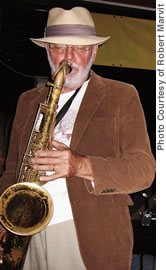The Healing Power Of Music

Interviewed by Lisa Asato
Wednesday - July 25, 2007
E-mail this story | Print this page | Comments (0) | Archive
 Del.icio.us Share
Del.icio.us Share

|
How does forensic neuropsychiatry relate to music therapy?
My private practice has to deal with post-traumatic injuries, what I refer to as “pain, strain and brain.” I see people who have had traumatic things happen to them, which may result in having pain problems, brain dysfunctions or stress reactions. So I refer patients for these kinds of (musical) interventions.
What is music therapy?
Music therapy is the prescribed use of music to restore, maintain, improve physical, emotional and physiological well-being.
What ailments is it used to treat?
Speech and hearing impairments, degenerative diseases like dementia or wasting conditions, multiple sclerosis, rheumatoid arthritis.
How does it work?
How it works really depends on the goal and objective because there’s no specific place in the brain that’s like a music center - all kinds of areas light up.
The primary goal areas that music therapy works in clearly include communication, motor, emotional and social skills. So when you look at conditions like autism, which is a communication disorder, or a stroke, where you can have motor impairment, you can utilize musical interventions.
I will give you one example of how it works in the case of stroke, which most people tend to be somewhat familiar with. The most common stroke is left-carotid artery blockage, you’re paralyzed on your right side of your body and you lose the power of speech temporarily, at least. So if the left side of the brain is impaired, what music therapy can do is called “melodic intonation.” ...
You can train the nonimpaired part of the brain to take over some of the functions that the impaired part has lost because music does-n’t go into the brain in the same way speech does. If you think about it, we all learn the alphabet by singing the ABCs. Also, people who stutter don’t stutter when they sing. So how it works is it lights up areas of the brain that can be trained, if you will. You’re basically recruiting areas to perform certain functions.
What makes it effective?
It’s like a muscle: if you exercise it, it’s going to get stronger. It’s going to be more functionally effective if the music therapy can recruit areas of the brain that are unim-paired and facilitate their application to the patient’s benefit ... the stroke patient can speak, the autistic kid can communicate, the motor-impaired individual can dance, the learning disabled can adapt to learning in a different way. I mean that’s strictly on the mechanical, neurological side, but the other side you have children with cancer in hospice and what makes them feel better ... So there’s like a repository in our emotional brain, if you will, for things of that nature, and music conjures up images. At one end you’ve got the mechanics of helping people to walk better, talk better, and at the other end you give them peace in stressful circumstances.
How long have you been practicing music therapy?
I’m not a music therapist, but I am on the board, and I do utilize music as a therapeutic tool, so the people who are music therapists who are sitting down with autistic children, people with developmental disabilities or stroke patients, are the people from Sounding Joy, which is the music therapy program here in Hawaii that provides services for people with disabilities and special needs with music therapy intervention.
Tell us about the Sounding Joy Music Therapy program.
Sounding Joy provides the services, they do public seminars and workshops. ... On Aug. 11 there will be a music therapy presentation at Waimanalo Health Center, and on Sept. 22 it will be the fifth anniversary gala concert at Mission Memorial Auditorium, and beginning Oct. 2 there will be a weeklong in-depth intensive music therapy seminar and lecture series. Sounding Joy’s phone number is 593-2620.
How does music apply in your life?
I try to play sax every day, and I find it therapeutic. I don’t suffer from any chronic conditions. I find music to be soothing, and I gave a presentation in May in Italy on brainwashing or undue influence and persuasion. My wife and I were motorcycling through the lake region of northern Italy, which is like a magical place. On my motorcycle I was listening with my iPod to the kind of music that puts me at one with the environment, and I don’t carry a cell phone when I’m there. (laughs) You get the picture, so yeah you can be carried away, you can be in an alternative mindset without losing sight of where you are. So for people who are in high-stress, high-demand occupations it’s a good therapeutic boost if you will.
Where do you play?
I play for the senior center at Waikiki Community Center on Mondays from 2 to 4 p.m., and I play with the Monday Night Band at Musicians’ Union studio six, which is free and open to the public.
This information is provided as educational and is not intended as a substitute for consultation with a physician. For questions, consult your physician or call the Honolulu County Medical Society, of which Marvit is a member, at 536-6988.
E-mail this story | Print this page | Comments (0) | Archive
Most Recent Comment(s):













